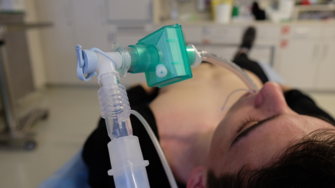How a Respiratory Therapist Compares to Other Careers
Respiratory therapists help patients with the most essential of human functions - breathing. Learn about this important career.

Every day, respiratory therapists assist millions of people catch their next breath. Literally. RTs, or respiratory therapists, mainly focus on treating chronic obstructive pulmonary disease, which is an umbrella term for a variety of ailments.
Chronic obstructive pulmonary disease covers any condition that reduces breathing capacity. Due to this, RTs may find themselves treating any of the following health issues:
- Asthma
- Chronic Bronchitis
- Heart Attack
- Stroke
- Sleep Apnea
- General Lung Problems
Let’s do a quick review of what an respiratory therapist does before we compare the position to other healthcare careers.
Average Day in the RT World
Respiratory therapists interact with nurses and patients on a pretty consistent basis. But unlike many of their colleagues, RTs typically stick to a 12-hour shift.
During the average patient evaluation, RTs typically perform a variety of tests, including a lung capacity examination. Once completed, these diagnostic procedures can be used to determine the best course of action.
Respiratory therapists often find themselves consulting with physicians and surgeons to diagnose the problems. The goal is to discuss options and determine a patient’s ongoing care after a procedure or visit.
RTs and RNs
Although the acronyms are similar, RTs are not RNs. RTs are different from nurses. Registered nurses, or RNs are not permitted to practice medicine without a physician supervising. RTs, on the other hand, are able to conduct their tests as soon as the patient is capable or available to do so.
Furthermore, RTs require way less educational training than most of their counterparts. For example, RNs usually undergo at least four years of accredited college courses. RTs only need two to earn their associate’s degree.
Salary Comparison
On average, an RT’s salary is about $58,000 whereas RNs usually make closer to $68,000.
Of course, the fast-track to starting a healthcare career may outweigh the pay cut. Especially when you factor in tuition fees and the position itself. According to USNews, RTs are ranked #16th in Best Healthcare Jobs, citing more flexibility and greater advancement opportunities as major contributors.
While surgeons, anesthesiologists, physicians, and dentists all make more than $100,000 on average, these positions also require more schooling, training, and demand round-the-clock hours. Respiratory therapists get to start helping patients after only two years.
And the job is in demand. Bureau Labor of Statistics has officially stated at least 30,000 new RTs are needed by 2026.
So if you want an exciting career that helps patients with the most essential human function, then consider becoming a respiratory therapist.

